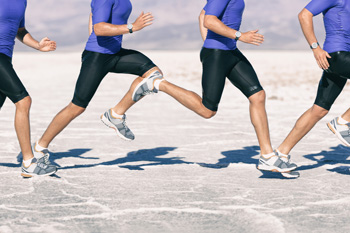
Walking seems so simple and is taken for granted by most of us. We do not think that with each step we take, there is a complex set of actions required by our unique arrangement of bones, tendons, and ligaments that are put into motion. The main tendon that is required to move the foot is the Achilles tendon. This tendon connects the calf muscle to the hindfoot bone. Ligaments are bands of elastic tissue that are between bones. To move, muscles require stimulation from nerves that feed into the foot. The plantar fascia, the connective tissue running along the bottom of the foot, acts as a springboard for stepping. The largest bone in the foot, which is known as the calcaneus, forms the heel bone and is vital for foot balance and strength. The forefoot’s five metatarsal bones lead to the phalanges that make up the toes of the foot. Few people have knowledge of how our feet work to get us from place to place, but everything is put together to make this happen smoothly. Most of us only learn some of the biomechanics of the feet when something goes amiss. If you would like to learn more about how feet are put together and function, make an appointment with a podiatrist who can answer any questions you may have.
If you have any concerns about your feet, contact Dr. Steven Shlonsky from Louisville, Kentucky. Dr. Shlonsky can provide the care you need to keep you pain-free and on your feet.
Biomechanics in Podiatry
Podiatric biomechanics is a particular sector of specialty podiatry with licensed practitioners who are trained to diagnose and treat conditions affecting the foot, ankle and lower leg. Biomechanics deals with the forces that act against the body, causing an interference with the biological structures. It focuses on the movement of the ankle, the foot and the forces that interact with them.
A History of Biomechanics
- Biomechanics dates back to the BC era in Egypt where evidence of professional foot care has been recorded.
- In 1974, biomechanics gained a higher profile from the studies of Merton Root, who claimed that by changing or controlling the forces between the ankle and the foot, corrections or conditions could be implemented to gain strength and coordination in the area.
Modern technological improvements are based on past theories and therapeutic processes that provide a better understanding of podiatric concepts for biomechanics. Computers can provide accurate information about the forces and patterns of the feet and lower legs.
Understanding biomechanics of the feet can help improve and eliminate pain, stopping further stress to the foot.
If you have any questions please feel free to contact our office located in Louisville, KY . We offer the newest diagnostic and treatment technologies for all your foot and ankle needs.







